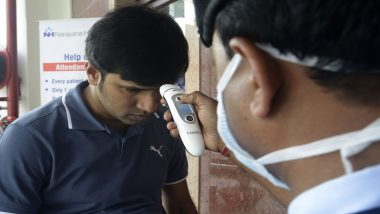The coronavirus Pandemic is real. More and more people are looking up the symptoms of COVID-19 to watch out for. Does experiencing a dry cough or fever means you have coronavirus? Or is it the breathlessness you are suddenly experiencing? Since very little information is available while various research on the subject is on-going, it is is important what happens when you are down with coronavirus based on information by WHO and other reliable sources. As we write this the number of coronavirus cases has reached 472,529. The total number of deaths around the world crossed 20k last night and has reached 21,305. About 114,740 people have recovered from the virus. As more and more people are being tested positive for COVID-19 globally, many people are wondering how they can prepare, what it is like to be infected by the novel coronavirus and how long do the symptoms last. What Is It Like to Live with Coronavirus? Ohio Couple Shares a Word of Caution About the Prevention of COVID-19.
While many patients had a scary end, for many, the signs were relatively mild. According to a recent study performed by the Chinese Center for Disease Control and Prevention, out of all the cases reported in China, 81 percent of them were mild. Yet still, many elders and those with a compromised immunity experienced pneumonia symptoms. Here's everything you need to know about how long does the virus last in your body.
What Are the Most Common Symptoms of The Novel Coronavirus?
Fever, cough, and shortness of breath are the tell-tale signs of the novel coronavirus. However, a person with a severe case of COVID-19 may experience weakness, lethargy and fever for a prolonged period. That said, in some mild cases, people may not show any symptom and still test positive. If you are showing one of these symptoms and if you have a previous travel history, make sure that you check with your doctor first. Coronavirus Outbreak: Children Rarely Have Symptoms if Infected by COVID-19, Says Study.
How Long Does the Incubation Period for Coronavirus Last?
If you have contracted the virus, you will start noticing symptoms anywhere between two to fourteen days. The COVID-19 symptoms typically show up five days after exposure. If you are under observation, you will be monitored for 14 days for the possible onset of the symptoms. Coronavirus Can Spread Even Before People Show Symptoms: Study.
How Long Does the Novel Coronavirus Last in A Person?
The duration of the symptoms depends on the severity of the disease. People with mild symptoms like flu and common cold tend to get better within 10 to 14 days. In severe cases, the virus can travel to the lungs, cause pneumonia and last for a longer time. Individuals with severe cases are treated symptomatically until symptoms resolve. Coronavirus Symptoms: When Should You Visit The Doctor? Expert Reveals the Common, Serious and Alarming Signs That You May Have COVID-19.
When Do You Stop Being Contagious?
Here too, it depends a lot on the severity of the case. Your symptoms must reduce, your body temperature must be normal without a fever, and you must have four COVID-19 tests completed to confirm that you have recovered from the virus. Doctors typically collect one swab from the throat and one from the nose and repeat the tests again after 24 hours before declaring a patient free of the virus.
That said, since the incubation period of the virus is 14 days, you will be contagious for two weeks, after being exposed to the novel coronavirus. Your healthcare professionals will tell you when you can go back to your normal activities.
(This article is written for an informative purpose and should not be substituted for medical advice. Kindly consult your doctor before trying any tips.)
(The above story first appeared on LatestLY on Mar 26, 2020 03:03 PM IST. For more news and updates on politics, world, sports, entertainment and lifestyle, log on to our website latestly.com).













 Quickly
Quickly


